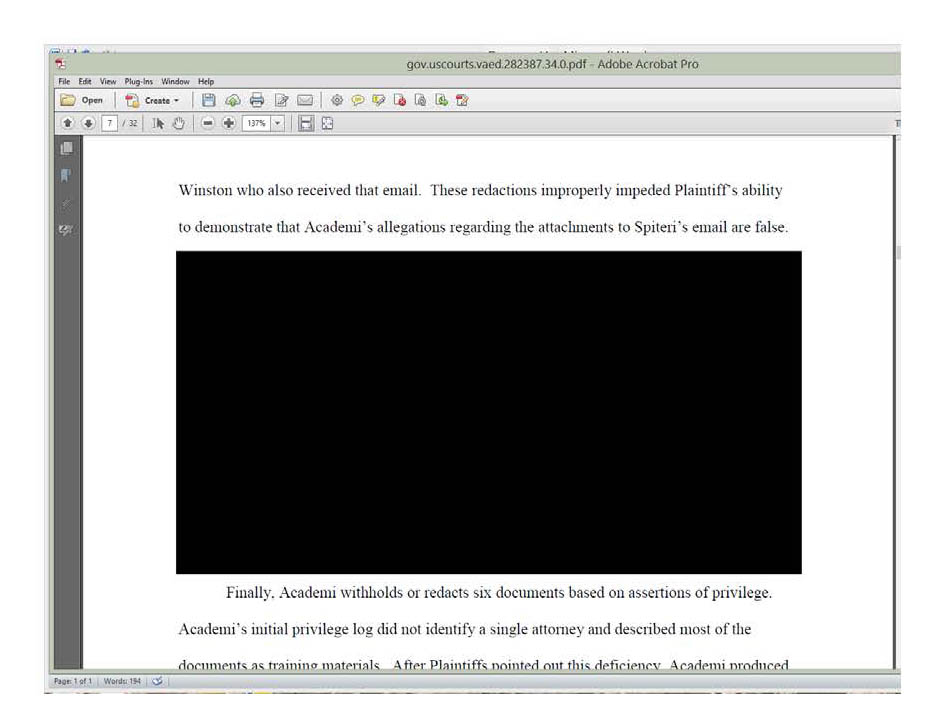Nothing Innocent or Harmless About Redactions In Discovery
Redaction can be a wonderful tool. It allows for the removal, or at least obscuring, of legitimately objectionable material within a document without excluding the entire document.
Redaction tools might be one of the most abused, misused, and dangerous tools delivered to lawyers in sometime.
Every corporate defendant in most every lawsuit believes their documents and information produced in the lawsuit are so critically, vitally important that they should all be protected from discovery and if the Court will order it, labelled all over with:
- Confidential
- Attorneys Eyes Only
- Trade Secret
- Not for filing without sealing
Even with a Court order that documents already in the public knowledge are not subject to the labeling as “confidential”; it seems nothing can stop parties from stamping EVERY document with “confidential” or a similar designation.
The Florida Rules of Civil Procedure allow for the withholding of information for attorney-client and work product privileges. Arguably, a party can seek to have the Court enter an order protecting documents as “trade secrets”; and nuances exist to these categories.
Corporate defense attorneys, however, have taken up the habit of redacting whatever they do not feel like producing and throwing up the shield of “relevance”. In other words, “(the defendant) objects to each Request to the extent that it seeks the disclosure of information which is beyond the permissible scope of Rule 1.280 of the Florida Rules of Civil Procedure, in that such information is irrelevant to the subject matter of this action and not reasonably calculated to lead to the discovery of admissible evidence.”
So says the defense.
Florida Rule of Civil Procedure 1.280(b) Scope of Discovery, (1) In General sets forth:
“Parties may obtain discovery regarding any matter, not privileged, that is relevant to the subject matter of the pending action, whether it relates to the claim or defense of the party seeking discovery or the claim or defense of any other party, including the existence, description, nature, custody, condition, and location of any books, documents, or other tangible things and the identity and location of persons having knowledge of any discoverable matter. “
The Rule also sets forth: “It is not grounds for objection that the information sought will be inadmissible at the trial if the information sought appears reasonably calculated to lead to the discovery of admissible evidence.”
When a party redacts entire sections of documents it is almost always impossible to gauge very important factors such as, context, timing, relationship to claims or defenses and other valuable information.
Often, the only redaction provision the Court will issue applies to the redaction of information relating to patients and medical personnel protected from disclosure under federal or state law. This redaction most frequently relates to HIPPA compliance.
In the case involving the manufacture of a medical device or a pharmaceutical drug, almost always the design and manufacture is at issue. Pharmaceutical and medical device manufacturers are subject to oversight by the Food & Drug Administration for their ultimate product, as well as the manufacturing processes used to make it.
The FDA regularly inspects facilities and will sometimes issue a “Form 483” to the manufacturer. The Form 483 sets forth lists of observations made by FDA inspectors considered problems by the FDA. Good practices require the manufacturer to provide a timely response (often within 15 days) that explains how the company views the “observations” and provides a timeline for correction.
The FDA encourages informal resolution of plant problems with drug and device manufacturers. A given manufacturing plant may receive one, two or three Form 483 observation reports before all the problems at the plant are resolved to the satisfaction of the FDA.
In a situation where a manufacturing plant has received multiple “Form 483” notices from the FDA and the notices apply to more than one of the product lines, a systemic problem may exist. That systemic problem may be in poor management, inadequate systems or a failure to adhere to good practices. If “Warning Letters” are sent by the FDA, the situation has gone beyond the local inspector and the regional FDA office has cause to be concerned.
Now, back to redactions.
In a lawsuit alleging that the ABC drug was negligently manufactured, resulting in injury to your client or to a whole class of people, you will receive discovery rank with redactions. You will see Form 483 issued by the FDA applying to more than one product line and it will be substantially redacted, but often including your ABC drug. The defendant may maintain the redactions in documents relate to “other product lines”.
Push the defendants to be cautious and conservative with redactions.
Educate the Court about the FDA process, the importance of the escalation being demonstrated through the documents and provide examples of redacted documents in which the context of the document is destroyed through the redactions. Demonstrate to the Court that multiple 483’s and Warning letters, incorporating more than one of the company’s manufactured products provides a foundation that demonstrates systemic problems that go far beyond just the subject product.
This evidence is also likely to expand the time period you first thought was involved. Just like any other manufacturer the problems in a drug or medical device plant develop over time.
Carefully examine the redactions being used by the defense team and do not permit them to go too far with that redaction tool. Without substantiation they should not exceed the scope of the court’s last protective order. And, if the redaction is based on relevance, force them to demonstrate why the particular discovery is irrelevant.
Share This



